You don’t know what you don’t know
Obvious right? If you don’t know something, you don’t even know you don’t know. But you do know that you don’t know everything, which is why you hire experts to help you with stuff like your taxes, your computer network, your health, and so forth. And this is why you hire people to help you with marketing, advertising, public relation, design and web development.
What is tricky about hiring experts to help you with what you don’t know, is that often you don’t know enough to ask the right questions or even evaluate the outcomes.
Let me give you a specific example. I hired someone (who shall remain nameless) to create my website using WordPress and transfer the contents of my former blog hosted at WordPress.com. Check and check. However, somehow people were still finding my old blog and commenting on stuff over there. The person I hired to develop my site had proven to be unreliable and has never been heard from since, so I couldn’t ask how to fix this problem.
I needed to make a few other backend changes and contacted Kim Woodbridge . I asked her how I could get people to stop going to my other blog. She told me that it was simple, all I had to do was pay WordPress.com to redirect people to my website. (Note: it took about two minutes and $13 to get people redirected.) Once people are no longer going to the other blog, I can bring it down.
I didn’t know what I had to do or I would have done it sooner. Since the first WordPress developer failed to do this or advise me to do this, people have been going to my old blog, not realizing it was housed elsewhere.
Working with experts
1. Remember: you don’t know what you don’t know. When hiring experts you are expecting they will have the knowledge you don’t. Sometimes they do, and sometimes they don’t. You must start with the assumption that nobody knows everything, but they may know more than you do.
2. Remember: you can question. If something seems wrong or gives you a funny feeling, question it. This is why we get second opinions from doctors. This is why if your taxes seem unusually high, you may ask your accountant to recalculate or even find another accountant.
3. Think of it as trial and error (and hopefully, more trial than error). But remember that you absolutely don’t know and the expert knows a bit more than you do.
Blog Workshop on Feb. 28
Want to improve your blogging? If you are located in the DC area, attend my upcoming How to Write Your Blog workshop on Thursday, February 28 in Silver Spring, MD. Details and registration are here.
About Deborah Brody
Deborah Brody writes and edits anything related to marketing communications. Most blog posts are written under the influence of caffeine.





